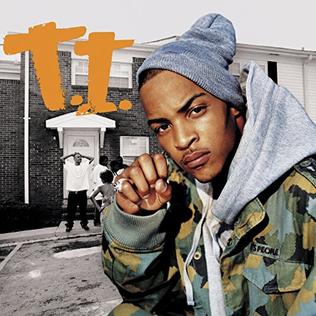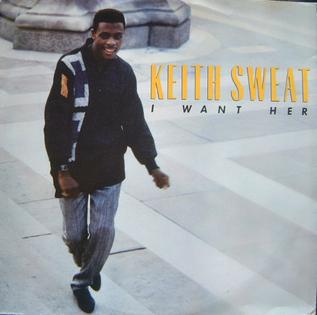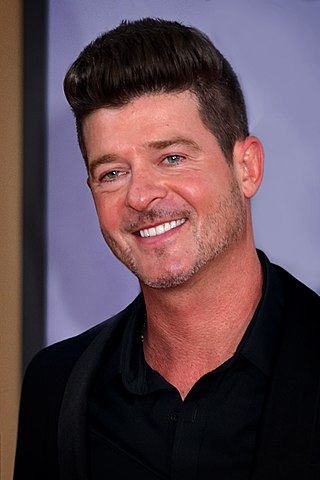
Keith Douglas Sweat is an American singer and songwriter. An early figure in the new jack swing musical movement, he is known for his collection of hits including "I Want Her," "Make It Last Forever," "I'll Give All My Love to You," "Make You Sweat," "Get Up on It," "Twisted," and "Nobody." He has released 13 solo albums and discovered the groups Silk and Kut Klose. Sweat's sound reportedly was influenced by Slave front man Steve Arrington and go-go music.
New jack swing, new jack, or swingbeat is a fusion genre of the rhythms and production techniques of hip hop and dance-pop, and the urban contemporary sound of R&B. Spearheaded by producers Teddy Riley, Bernard Belle, Jimmy Jam and Terry Lewis, new jack swing was most popular from the late 1980s to early 1990s.

Stephen Ellis Garrett Jr., known professionally as Static Major, was an American R&B and hip hop producer, singer, rapper, and songwriter from Louisville, Kentucky. He is best known for his posthumous guest appearance on Lil Wayne's 2008 single "Lollipop", which peaked atop the Billboard Hot 100 and received diamond certification by the Recording Industry Association of America (RIAA). The song and its music video were both released in memory of his death in February of that year.
Contemporary R&B is a popular music genre that combines rhythm and blues with elements of pop, soul, funk, hip hop, and electronic music.

"Poison" is the debut single of American vocal group Bell Biv DeVoe, released as the first single from their debut album of the same name. The song, in the style of new jack swing, a late-1980s/early-1990s hybrid of R&B, hip hop and swing, was the group's most successful.

American R&B singer-songwriter R. Kelly has released 18 studio albums, five compilation albums, one soundtrack album, six video albums, one mixtape, two extended play, and 133 singles.
Portrait is an American R&B and hip hop vocal quartet, consisting of members Michael Angelo Saulsberry, Irving Washington III, Eric Kirkland and Philip Johnson. The quartet group's music sound was influenced by the new jack swing style of the late 1980s and early 1990s.

The discography of Nas, an American rapper, consists of seventeen studio albums, one collaborative album, one group album, five compilations, four mixtapes, one extended play, and seventy-nine singles. Nas has sold over 20 million records in the United States alone, and 35 million albums worldwide.

Urban Legend is the third studio album by American rapper T.I., released on November 30, 2004, through Grand Hustle Records and Atlantic Records. The album debuted at number seven on the US Billboard 200, selling 193,000 copies in its first week of release. It also debuted atop the magazine's Top R&B/Hip-Hop Albums and Top Rap Albums charts.

The discography of the Game, an American rapper, consists of ten studio albums, six compilation albums, two soundtrack albums, fifteen mixtapes, 31 singles, and 39 music videos. His music released on major record labels such as Interscope, Geffen, and DGC Records, along with subsidiaries Aftermath Entertainment and G-Unit Records, including independent record labels Get Low Recordz and Fast Life Music, Inc. Records of which has released some of his early material.

American rapper DMX released eight studio albums, seven compilation albums, three mixtapes, 47 singles and 24 music videos.

The discography of Ludacris, an American rapper from Atlanta, Georgia, consists of nine full studio albums along with two compilation albums, one extended play (EP), six mixtapes, nine promotional singles and 89 singles—including 51 as a featured artist. From the total number of singles released by or featuring Ludacris, 35 have peaked within the top 40 of the US Billboard Hot 100 chart. Of his nine solo studio albums, four have peaked the Billboard 200 chart, while another four have peaked within the top five.

The discography of Common, an American rapper, consists of fourteen studio albums, one collaborative album, one extended play, two compilation albums, forty-nine singles and twenty-one music videos. It also contains the list of Common songs. Common sold more than 2.8 million albums in the United States. Common released his first album, Can I Borrow a Dollar? (1992), and follow suit with his second album, Resurrection, which met with critical acclaim, calling the album as one of the classic of the 90s. Common released his third album, One Day It'll All Make Sense, which was a little commercial success, follow suit with his fourth album, Like Water for Chocolate, which was met with critical acclaim from music critics, calling it the best rap album of the year. The album was also a commercial success certifying it gold by the Recording Industry Association of America (RIAA). His fifth studio album Electric Circus was met with acclaim from music critics. However, it failed to meet the commercial success with Like Water for Chocolate, which only peaked at number 47 on the US Billboard 200.

"I Want Her" is a song by American R&B singer Keith Sweat. As the first single from his debut album, Make It Last Forever, it reached number five on the Billboard Hot 100 and number one on the Hot R&B/Hip-Hop Singles & Tracks chart for three weeks. and became the most successful number one single of 1988 on the Billboard Hot R&B chart. "I Want Her" also peaked at number 38 on the dance chart. The song topped the R&B Billboard Year-End chart for 1988. It was ranked number 6 on complex.com's list of 25 best new jack swing songs of all time.

The discography of American singer Robin Thicke consists of 8 studio albums, 30 singles and 23 music videos. Thicke signed his first recording contract with Interscope Records as a teenager and found success as a songwriter, before he began concentrating on his career as a performer. In 2000, Thicke started recording his debut album, A Beautiful World, which was released in April 2003. The album debuted at number 152 on the US Billboard 200, selling 119,000 copies. The record also peaked at number 36 on the Mega Album Top 100 in the Netherlands. Two singles were released from the album; the first, "When I Get You Alone" became a top ten hit in the Netherlands and New Zealand. That single also peaked at number 17 in Australia and was certified gold by the Australian Recording Industry Association (ARIA). In 2006, Thicke released his second studio album The Evolution of Robin Thicke. The record debuted at number 5 on the US Billboard 200, topped it on the Billboard's Top R&B/Hip-Hop Albums, and became a certified platinum by the Recording Industry Association of America (RIAA). The album also charted in France, the Netherlands, and the United Kingdom. The Evolution of Robin Thicke produced four singles, all of which charted on the Billboard's Hot R&B/Hip-Hop Songs. "Lost Without U" became one of his biggest hits, peaking at number 14 on the US Billboard Hot 100 and spending 11 weeks atop the Billboard's Hot R&B/Hip-Hop Songs.
The Hot R&B/Hip-Hop Songs chart ranks the most popular R&B and hip hop songs in the United States and is published weekly by Billboard. Rankings are based on a measure of radio airplay, sales data, and streaming activity. The chart had 100 positions but was shortened to 50 positions in October 2012.

The discography of American singer John Legend consists of ten full-length studio albums, five live albums, two video albums, three extended plays, 51 singles and two promotional singles.

American rapper Lil Wayne has released 286 singles including 19 promotional singles. Lil Wayne attained his first singles chart entry in 1999 as a featured artist on Hot Boys member Juvenile's single "Back That Azz Up", which peaked at number 19 on the United States Billboard Hot 100 and became a top ten hit on the Hot R&B/Hip-Hop Songs and Hot Rap Songs charts. Wayne later released his debut solo studio album Tha Block Is Hot in November 1999. Its title track and lead single, which features B.G. and Juvenile, reached number 72 on the Billboard Hot 100. Lights Out followed in December 2000 and produced the singles "Get Off the Corner", "Everything" and "Shine". "Way of Life", the lead single from Wayne's third studio album 500 Degreez, peaked at number 71 on the Hot 100 and became a top 20 hit on the Hot Rap Songs chart. In 2004, Wayne was featured on the single "Soldier" by American girl group Destiny's Child, which became his first top ten hit on the Hot 100 and enjoyed commercial success internationally.

The American rapper Jay-Z has released 68 singles as a lead artist, 51 singles as a featured artist, and 14 promotional singles. "Can't Knock the Hustle" was the rapper's breakout hit, serving as lead single for his debut studio album, Reasonable Doubt (1996). During 1997, Jay-Z saw continued success with his singles "Sunshine", which peaked at number 25 on the UK singles chart, and "Wishing on a Star", which peaked at number 13. "The City Is Mine" was the most successful single of his second album, In My Lifetime, Vol. 1 (1997), which peaked at number three on the US Billboard 200 and received positive reviews from critics. In 1998, he released the singles "Can I Get A..." and "Hard Knock Life ", which peaked at numbers 19 and 15 on the US Billboard Hot 100, respectively. Both preceded his third album, Vol. 2... Hard Knock Life (1998), and led it to debut atop the Billboard 200. His fourth album, Vol. 3... Life and Times of S. Carter (1999), became his second album to do so, and spawned the Billboard Hot 100-top 40 singles "Jigga My Nigga" and "Big Pimpin'" ; the latter received platinum certification by the RIAA.

American rapper Kanye West has released 138 singles, four promotional singles and charted with 65 other songs.
















